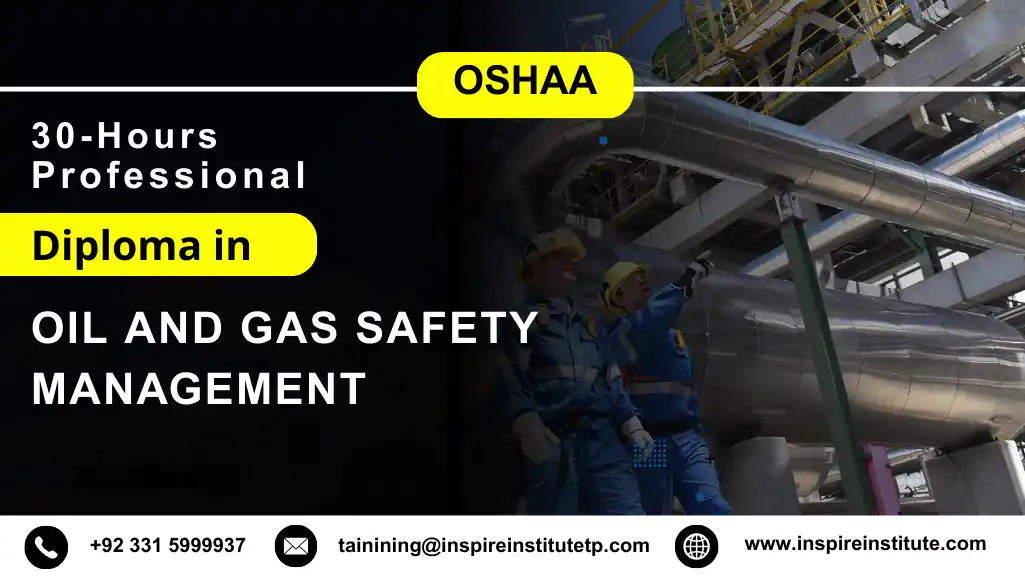OSHAA 30-Hours Professional Diploma in Oil and Gas Safety Management
With the rapid expansion of oil and gas projects worldwide, the demand for qualified safety managers and supervisors has never been greater. This program follows international occupational safety standards and delivers comprehensive insights into regulatory compliance, emergency response planning, and effective implementation of safety management systems. Participants gain the confidence and expertise required to protect workers, assets, and the environment while meeting global safety benchmarks.
The OSHA 30-Hours Oil and Gas Safety Diploma is ideal for safety officers, HSE managers, supervisors, engineers, and professionals aspiring to enhance their career in the oil and gas sector. It emphasizes practical applications, real-world case studies, and industry best practices, ensuring learners are prepared to handle complex safety challenges in upstream, midstream, and downstream operations.
By completing this diploma, professionals not only strengthen their career opportunities but also contribute to fostering a safer workplace culture across the oil and gas industry on an international level.
Why Choose this Qualification
Selecting the OSHA 30-Hours Professional Diploma in Oil and Gas Safety Management is a smart choice for individuals aiming to build a strong career in occupational health and safety within the oil, gas, and petrochemical sectors. This qualification not only enhances your professional standing but also equips you with globally recognized skills to ensure workplace safety and regulatory compliance in one of the most demanding industries.
- Internationally recognized qualification that opens career opportunities worldwide in oil and gas projects.
- Specialized training focused on industry-specific risks, hazards, and safety management systems.
- Comprehensive coverage of OSHA standards, regulations, and global safety best practices.
- Strengthens knowledge of hazard identification, accident prevention, and emergency response planning.
- Enhances career progression for safety officers, supervisors, engineers, and HSE managers.
- Builds practical expertise through case studies and real-world applications.
- Demonstrates commitment to workplace safety, regulatory compliance, and sustainable operations.
- Increases employability across upstream, midstream, and downstream oil and gas operations.
- Recognized by employers as proof of advanced competence in safety leadership.
- Provides lifelong skills that contribute to reducing risks, protecting lives, and ensuring operational excellence.
By choosing this diploma, professionals gain a competitive edge in today’s global job market while contributing to a safer and more sustainable oil and gas industry. It is not just a qualification but an investment in career advancement, professional growth, and international recognition.
Course Overview
UK based Qualification
Study Units: 5 Units
Evidence & Assignment Based
Mandatory Units
Who Should Take This Course
The OSHA 30-Hours Professional Diploma in Oil and Gas Safety Management is designed for individuals working in or aspiring to join the oil, gas, and petrochemical industries who want to enhance their knowledge, skills, and professional standing in health and safety management. As the oil and gas sector is one of the most high-risk industries, this qualification is highly valuable for professionals aiming to take on greater responsibilities in ensuring safe, compliant, and efficient operations.
- Health and Safety Officers who want to expand their expertise and progress into senior-level roles.
- Engineers and Technical Staff seeking to strengthen their understanding of HSE practices in oil and gas environments.
- Supervisors and Team Leaders responsible for managing workers and enforcing safety protocols on-site.
- Project Managers who oversee large-scale oil and gas projects and require strong safety management knowledge.
- HSE Managers and Consultants aiming to refine their skills in compliance, risk control, and incident prevention.
- Oil and Gas Professionals working in upstream, midstream, or downstream operations who want to enhance safety leadership.
- Fresh graduates or new entrants aspiring to build a career in occupational health and safety within the energy sector.
- Contractors and Service Providers in the oil and gas supply chain who must comply with international safety standards.
This course is suitable for both experienced professionals and those new to the industry, providing the essential foundation and advanced insights needed to excel in safety management. By enrolling, learners position themselves as highly competent, industry-ready professionals capable of handling safety challenges in the world’s most demanding sector.
Course Benefits
The OSHA 30-Hours Professional Diploma in Oil and Gas Safety Management provides a wide range of benefits for individuals aiming to establish or advance their careers in the oil, gas, and petrochemical industries. This diploma not only enhances professional knowledge but also equips learners with practical skills that are highly valued by employers worldwide. By completing this program, participants gain a strong foundation in occupational health and safety while developing the confidence to manage safety challenges in complex and high-risk environments.
- Globally recognized qualification that improves employability in international oil and gas projects.
- Builds specialized knowledge of OSHA standards and safety practices tailored to the energy sector.
- Strengthens expertise in hazard identification, accident prevention, and risk management.
- Enhances leadership and decision-making skills for safety-critical operations.
- Provides practical knowledge through case studies, real-world examples, and industry best practices.
- Prepares learners for higher-level roles such as Safety Manager, HSE Supervisor, or Project Safety Coordinator.
- Increases job security and career progression opportunities in upstream, midstream, and downstream operations.
- Demonstrates professional commitment to workplace safety, regulatory compliance, and environmental protection.
- Equips participants with lifelong skills that reduce risks, save lives, and promote sustainable operations.
- Widens opportunities for further qualifications and advanced training in occupational health and safety.
Completing this diploma is more than just earning a certificate—it is an investment in your future career growth, professional recognition, and contribution to creating safer workplaces within the oil and gas sector globally.
Eligibility Criteria
The OSHA 30-Hours Professional Diploma in Oil and Gas Safety Management is open to learners from diverse educational and professional backgrounds. The entry criteria are designed to ensure that participants have the right foundation to benefit from the training while keeping the course accessible to aspiring professionals as well as experienced individuals.
Educational Background
Minimum requirement: High school diploma, intermediate, or equivalent qualification.
Higher qualifications are an advantage but not mandatory.
Professional Experience
Prior experience in oil, gas, engineering, construction, or industrial sectors is beneficial.
Work experience is not compulsory; beginners can also apply.
Language Proficiency
Ability to read, write, and understand English to engage with course materials and assessments.
Skills and Motivation
Basic awareness of workplace safety practices is recommended.
Strong motivation and interest in pursuing a career in occupational health and safety.
Accessibility
The program is structured to support both newcomers to the safety field and experienced professionals aiming to enhance their knowledge.
The Qualification Process
The OSHA 30-Hours Professional Diploma in Oil and Gas Safety Management follows a structured qualification process that ensures learners meet international safety standards and demonstrate competency in all required areas. Below is a step-by-step guide to help you understand the journey from enrollment to certification:
Step 1: Self-Assessment
Learners begin by reviewing the entry requirements to confirm eligibility. Candidates should hold at least a high school qualification or equivalent and have an interest in occupational health and safety. Prior industry experience is helpful but not mandatory.
Step 2: Registration
Complete the registration process by submitting the required documents, such as a valid ID, and paying the registration fee. This marks your official start in the qualification process.
Step 3: Induction
An induction session is conducted to verify eligibility and explain the evidence and assessment requirements.
- If the learner meets the criteria, they continue to the next stage.
- If eligibility is not met, registration will be canceled, and fees refunded.
Step 4: Evidence Submission
Learners are required to submit assignments, case studies, or professional records that demonstrate their understanding of OSHA standards, hazard control, and oil and gas safety management practices.
Step 5: Feedback and Revision
The assessor reviews the submitted evidence. If gaps are identified, learners will receive feedback and have the opportunity to revise and resubmit their work until it meets the set criteria.
Step 6: Competence Evidence
Once all criteria are met, learners provide final evidence showcasing their competence in oil and gas safety management. The assessor confirms completion of all learning outcomes.
Step 7: Internal Quality Assurance (IQA)
The Internal Quality Assurance team reviews the assessment process to ensure fairness, accuracy, and compliance with OSHA standards.
Step 8: External Verification
The portfolio is then submitted for External Quality Assurance (EQA), where external verifiers confirm the authenticity and standard of the learner’s evidence.
Step 9: Certification
Upon successful verification, learners are awarded the OSHA 30-Hours Professional Diploma in Oil and Gas Safety Management Certificate, proving their advanced knowledge and professional competence.and meet the high standards required for the Level 4 International Diploma in Disaster Management.







